英汉委婉语对比研究
英汉委婉语的对比

英汉委婉语的对比摘要:英汉两种语言都有大量的委婉语,具有颇多相似处。
但因其属于不同语系、不同的文化传统、不同的历史背景等因素,它们在委婉语方面的差别尤为明显。
本文对“生理现象”委婉语的表达形式及其所蕴涵的文化内涵进行了对比分析,以促进人们对此问题的进一步认识,加深彼此间的文化了解。
关键词:生理现象委婉语表达形式文化内涵1. 引言使用委婉语是世界各个民族语言的一种普遍现象。
委婉语的基本特征就是用一种令人愉快的、委婉有礼的、听起来不刺耳的词语来代替令人不快的、粗鲁无礼的、听起来刺耳的词语。
(邓炎昌,1989:220)英汉两种语言都存在着大量的委婉语。
这两种语言中的委婉语在表达形式以及所蕴涵的文化内涵既有相同之处,也具有很大的差异。
本文试从“生理现象”方面几种主要委婉语的表现形式和文化内涵进行对比分析,以期加深对英汉两种语言文化的了解。
2. 英汉“生理现象”委婉语对比世界上的不同民族都是人类的组成部分,都具有人类共同的生理现象和生理特征。
人们在很多情况下都很忌讳另人不快、感觉不雅的生理现象,从而经常采用间接、回避、模糊、甚至美化的委婉方式来迂回地表达令人不悦的生理现象(魏在江,2001:7)。
因此,英汉“生理现象”的委婉语具有很多相似之处。
但是,英汉则是两种不同的语言,分别属于不同的语系,在历史、文化、思维、心理等诸多方面都存在着巨大的差别,因此,英汉“生理现象”方面的委婉语的区别就更为明显。
本文对“生理现象”之排泄、疾病、死亡三个方面的委婉语进行了对比分析。
2.1 排泄世界各民族历来对人体所排出的各种气味和污物持厌恶避讳的态度。
这方面的委婉语在英汉两种语言中都非常丰富。
如表示“上厕所”,英语有:go to the public comfort station, see the stars, see one’s aunt, pass water, answer nature’s call, do one’s business, get some fresh air 等等。
英汉委婉语的对比分析及其翻译研究
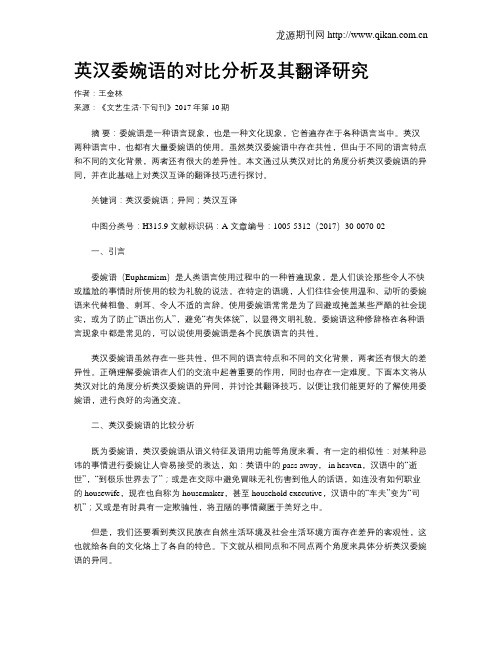
英汉委婉语的对比分析及其翻译研究作者:王金林来源:《文艺生活·下旬刊》2017年第10期摘要:委婉语是一种语言现象,也是一种文化现象,它普遍存在于各种语言当中。
英汉两种语言中,也都有大量委婉语的使用。
虽然英汉委婉语中存在共性,但由于不同的语言特点和不同的文化背景,两者还有很大的差异性。
本文通过从英汉对比的角度分析英汉委婉语的异同,并在此基础上对英汉互译的翻译技巧进行探讨。
关键词:英汉委婉语;异同;英汉互译中图分类号:H315.9 文献标识码:A 文章编号:1005-5312(2017)30-0070-02一、引言委婉语(Euphemism)是人类语言使用过程中的一种普遍现象,是人们谈论那些令人不快或尴尬的事情时所使用的较为礼貌的说法。
在特定的语境,人们往往会使用温和、动听的委婉语来代替粗鲁、刺耳、令人不适的言辞。
使用委婉语常常是为了回避或掩盖某些严酷的社会现实,或为了防止“语出伤人”,避免“有失体统”,以显得文明礼貌。
委婉语这种修辞格在各种语言现象中都是常见的,可以说使用委婉语是各个民族语言的共性。
英汉委婉语虽然存在一些共性,但不同的语言特点和不同的文化背景,两者还有很大的差异性。
正确理解委婉语在人们的交流中起着重要的作用,同时也存在一定难度。
下面本文将从英汉对比的角度分析英汉委婉语的异同,并讨论其翻译技巧,以便让我们能更好的了解使用委婉语,进行良好的沟通交流。
二、英汉委婉语的比较分析既为委婉语,英汉委婉语从语义特征及语用功能等角度来看,有一定的相似性:对某种忌讳的事情进行委婉让人容易接受的表达,如:英语中的pass away, in heaven,汉语中的“逝世”,“到极乐世界去了”;或是在交际中避免冒昧无礼伤害到他人的话语,如连没有如何职业的housewife,现在也自称为housemaker,甚至household executive,汉语中的“车夫”变为“司机”;又或是有时具有一定欺骗性,将丑陋的事情藏匿于美好之中。
英汉委婉语交际功能比较
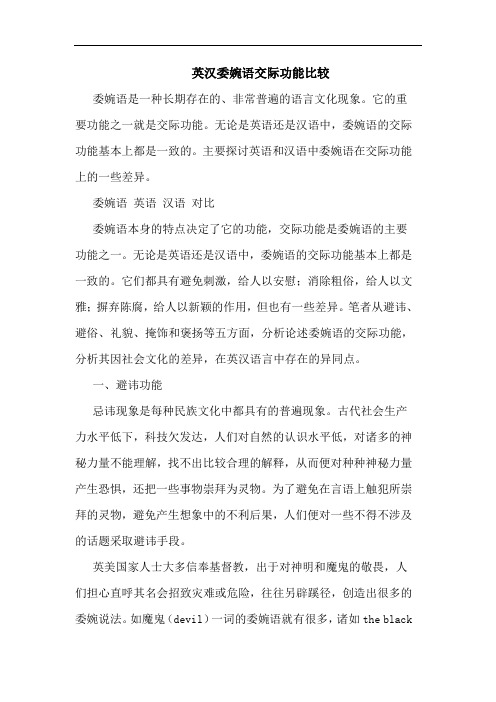
英汉委婉语交际功能比较委婉语是一种长期存在的、非常普遍的语言文化现象。
它的重要功能之一就是交际功能。
无论是英语还是汉语中,委婉语的交际功能基本上都是一致的。
主要探讨英语和汉语中委婉语在交际功能上的一些差异。
委婉语英语汉语对比委婉语本身的特点决定了它的功能,交际功能是委婉语的主要功能之一。
无论是英语还是汉语中,委婉语的交际功能基本上都是一致的。
它们都具有避免刺激,给人以安慰;消除粗俗,给人以文雅;摒弃陈腐,给人以新颖的作用,但也有一些差异。
笔者从避讳、避俗、礼貌、掩饰和褒扬等五方面,分析论述委婉语的交际功能,分析其因社会文化的差异,在英汉语言中存在的异同点。
一、避讳功能忌讳现象是每种民族文化中都具有的普遍现象。
古代社会生产力水平低下,科技欠发达,人们对自然的认识水平低,对诸多的神秘力量不能理解,找不出比较合理的解释,从而便对种种神秘力量产生恐惧,还把一些事物崇拜为灵物。
为了避免在言语上触犯所崇拜的灵物,避免产生想象中的不利后果,人们便对一些不得不涉及的话题采取避讳手段。
英美国家人士大多信奉基督教,出于对神明和魔鬼的敬畏,人们担心直呼其名会招致灾难或危险,往往另辟蹊径,创造出很多的委婉说法。
如魔鬼(devil)一词的委婉语就有很多,诸如the blackone, old boy, the tempter,the big d, old harry,the enemy (of mankind),the wicked,old nick,prince of darkness等。
而在中国情况就不一样了,中华民族没有形成统一的宗教信仰,佛教、道教、伊斯兰教在汉民族中都有很多的信徒。
可以说,宗教禁忌在中国产生的影响远没有英语国家那么深远。
当人们谈到“鬼”时,远远没有西方人那么惧怕;对带有“鬼”字的说法如“钟馗捉鬼,鬼东西,扮鬼脸”等往往直言不讳。
但在中国,与西方宗教禁忌可以势敌的便是避官讳,名讳。
如在封建社会与帝王姓名相同的字或音是不能用的。
英汉委婉语对比研究

英汉委婉语对比研究作者:孙燕燕来源:《智富时代》2015年第07期【摘要】委婉语是一种委婉含蓄、烘托暗示的语言表达方法,是人们协调人际关系的一个重要手段。
英汉两种语言在委婉语这种修辞上存在很多相似与不同的地方。
本文主要探讨英汉委婉语的异同点,使学生更好地掌握委婉语。
【关键词】委婉语;英语;汉语一、引言在人际交往过程中,在某些场合,对某些忌讳的、粗俗的、刺耳的或隐私的事物,人们往往不愿意直截了当地使用某些词语或表达形式,而刻意地选择那些较温和的、较委婉的、较含蓄的说法予以替代,让那些人们不愿意直接提及的事物更悦耳、更动听。
这些具有替代作用的表达方式就是委婉语。
用钱冠连教授的话来说,委婉语的出现和使用,“表现了人对意义的追求,表现了功利目的和对不宜说的话题的补救的努力”(钱冠连, 1996)。
从这个意义上来讲,委婉语其实就是人们人际交往和言语交际的过程中为谋求理想的交际效果而创造的一种委婉含蓄的语言表达形式。
不同语言中委婉语具有不同的的表现形式。
本文结合语言实例,对汉英委婉语的应用进行对比分析。
二、汉英委婉语对比(一)相同点随着社会的发展,委婉语已渗透到各个领域。
尽管汉英委婉语在禁忌方面有着各自的特色和民族习惯。
但是仍然在某些领域的禁忌是在两个社会中普遍存在的,成为了汉英委婉语的共同使用领域。
例如,汉英委婉语都与死亡、疾病、职业、性等密切相关。
(1)死亡方面:死亡是人人都想逃避的痛苦的现实,在汉英中都是禁忌话题。
例如:中国佛教把死婉称为“入寂”“圆寂”;古代皇帝死亡则称为“驾崩”;百姓之死称为“过世”等。
英语中有:to go out of his word, be asleep in the Arms of God, to leave the world.(2)疾病方面:汉语中有“有了”,“有喜”等。
英语中有in a family way(家常打扮),in trouble(惹上麻烦)等。
(3)排泄方面:如关于上厕所,汉语有“洗手、方便”;英语中有wash one’s hand,relieve oneself, powder her nose, feel the call of nature(感觉到自然在召唤,意为“要上厕所”)。
英汉委婉语对比与翻译
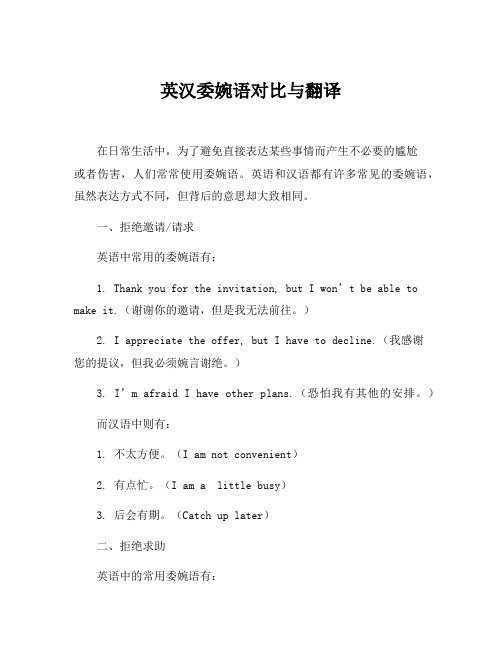
英汉委婉语对比与翻译在日常生活中,为了避免直接表达某些事情而产生不必要的尴尬或者伤害,人们常常使用委婉语。
英语和汉语都有许多常见的委婉语,虽然表达方式不同,但背后的意思却大致相同。
一、拒绝邀请/请求英语中常用的委婉语有:1. Thank you for the invitation, but I won’t be able to make it.(谢谢你的邀请,但是我无法前往。
)2. I appreciate the offer, but I have to decline.(我感谢您的提议,但我必须婉言谢绝。
)3. I’m afraid I have other plans.(恐怕我有其他的安排。
)而汉语中则有:1. 不太方便。
(I am not convenient)2. 有点忙。
(I am a little busy)3. 后会有期。
(Catch up later)二、拒绝求助英语中的常用委婉语有:1. I’d love to help, but unfortunately I’m tied up at the moment.(我很想帮忙,但目前很忙。
)2. I’m sorry, I don’t think I can be of much help in this case.(抱歉,我觉得我对这个事情没有什么帮助。
)3. I appreciate your asking me, but I don’t think I’m the right person to help you.(感谢你向我求助,但我认为我不是合适的人选。
)而汉语中则有:1. 实在抱歉。
(I am really sorry)2. 我没有时间。
(I don't have the time)3. 非常抱歉,我不能帮您。
(I'm terribly sorry, I cannot help you.)三、让对方不要打扰英语中常用的委婉语有:1. I’m sorry, I’m not feeling well, so I need to rest.(抱歉,我不太舒服,需要休息。
英汉委婉语的对比应用研究

语 言凝结 的经典 。随着 语 言 的不 断发 展 , 婉语 委 在 不断 变化并被 广 泛应 用 。李 国南 在 《 论 英汉 试 修 辞格 对 比研 究 的基 础 、 目的及 方 法 》 文 中提 一
到: 英语 “ u h mi 涵 盖 了汉 语 的 “ E pe s m” 委婉 语 ” ,
An l s s o a y i f Eng i h a ls nd Chi s p m i m t a p e ne e Eu he s wih Ex m l s
x U E W e i
( n Un v r i fAr sa d S in e Xi i e st o t n c e c ,Xi n 7 0 6 ,C i a a y 10 5 a hn )
Chi e e e ph mim nd Eng ih e he im ho l b y s h r e s a o di tmulto n s u e s a ls up m s s u d o e uc uls a v i ng s i a i n,ofe i f rng c mf r ,ei na i g v g rt o o t lmi tn ul a iy,f r i g a s h tc f ei o m n e t e i e l ng,e c t .Onl m p o ng t e a pr p it u e y e l yi h p o ra ee ph —
第2 8卷
第2 期
西 建 科 技 学 报(会 版) 安 筑 大 学 社 科学
J Xi l Un v fAr h & Te h ( oil c n eE io ) . l i.o c . a c . S c i c dt n aS e i
Vo . 8 No 2 12 .
论文:委婉语
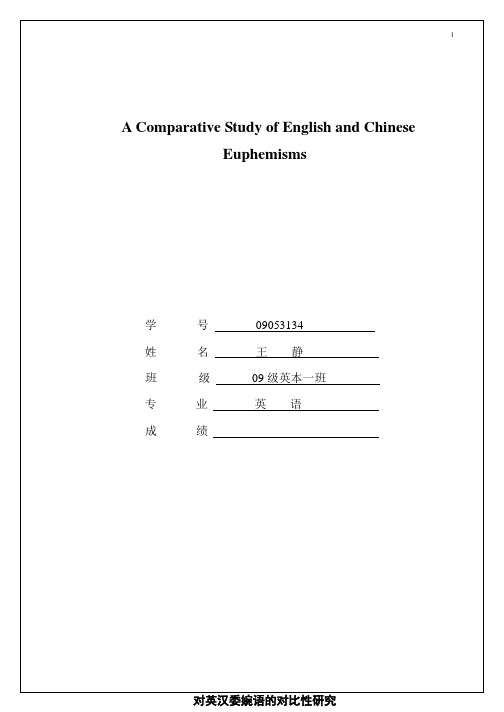
A Comparative Study of English and ChineseEuphemisms学号09053134姓名王静班级09级英本一班专业英语成绩对英汉委婉语的对比性研究摘要:委婉语是一种不用明说的、能够使人感到愉快或含糊的的说法代替具有令人感到不悦的含义或不够尊敬的表达方式。
委婉语这个词使用来自希腊,eu,意思是“好”或“听起来不错”。
pheme意味着说法。
字面意思是好的说法。
作为不可或缺的语言和自然的一部分,委婉语已引起了广泛兴趣。
因此,在其他研究者的基础上,本论文试图通过比较性研究委婉语与文化禁忌语的关系以及英汉委婉语的相似点和不同点,对英汉委婉语做一个全面的分析,旨在加深对委婉语的理解以及更好地在外语学习,跨文化交际以及我们的日常生活中使用它。
关键词:委婉语;相似性;差异;研究A Comparative Study of English and Chinese EuphemismsAbstract: Euphemism is mild, agreeable or, roundabout words use in place of coarse , painful or offensive ones. The term comes from Greek, eu meaning “well” or “sounding good ”. pheme means speech. Euphemism literally means good or pleasant speech. As an indispensable and natural part of language, euphemism has been arousing wide interest .Thus on the basis of others' researches, this thesis attempts to do a comprehensive analysis of English euphemism and Chinese euphemism by comparatively analyzing the relationship of euphemism with culture and taboos, and the similarities and differences of English and Chinese euphemism, aiming at deepening the understanding of the euphemism and to better use it in foreign language learning ,cross-cultural communication as well as in our everyday life .Keywords: euphemism; similarities; differences; analysisTable of contents1 .Introduction (1)2 A Brief Introduction to Euphemism (2)2.1A General Review of the Studies on Euphemism (2)2.2 Euphemism and Culture (3)2.3 Euphemism and Taboo (4)3 .Study on Euphemisms in English and Chinese (5)3.1 Comparison of Euphemisms in English and Chinese (5)3.2 Cultural Reasons for the Differences in Expressions (8)4 .Conclusion (9)Works Cited (11)1 .IntroductionEuphemism is the figure of speech which consists in the substitution of a word or expression of comparative favorable implication or less unpleasant associations instead of the harsher or more offensive one (Zhao 153). Politeness, as a symbol of human civilization, is a social、cultural as well as linguistic phenomenon that can be found in all languages and cultures. Euphemism is a strategy to achieve politeness in people’s daily conversation. Euphemisms, in a broad se nse, include all the ways of euphemistic expressions, such as words, phrases, sentences and discourses etc. In specific situation and context, even some nonverbal expressions can achieve the same effect as the verbal euphemisms.In the modern life, as a cultural phenomenon, euphemism is widely used more out of politeness than fear and the principles of politeness in west and east share something in common. Besides, English and Chinese euphemism is based on similar psychological factors: the psychology of pursuing beauty and self-defense. And dissimilarities or differences on cultural connotations in English and Chinese euphemisms exist, mainly focusing on the root of traditional culture and the value orientation. To be familiar with the linguistic features of euphemism in the target culture, to be aware of the differences between the target culture and the native culture and to interpret and use euphemism according to social context are keys to effective employment of euphemism in intercultural communication.2 .A Brief Introduction to Euphemism2.1A General Review of the Studies on EuphemismEuphemism is a common linguistic phenomenon in different cultures. Many scholars at home and abroad have made studies of euphemisms from different perspectives.British writer George Blunt advanced the term “euphemism” defining it as “a good or favorable interpretation of a bad word” .In 1983, American scholars J. S. Neaman&C.C. Silver published their book Kind Words, a Thesaurus of Euphemisms, which presents a detailed description on the history of euphemisms as well as deep discussions on that field. R.W. Holder’s A Dictionary of Euphemisms in 1995 illustrate euphemistic words and expressions with rich examples. Robert Burchfield’s view(2003), a language without euphemism would be a defective instrument of communication.The recorded study of Chinese euphemism dates back to Zhou Dynasty. As in the case of its English counterparts, ancient studies of Chinese euphemisms focus on the avoidance of certain names and of the folk customs at lexical level. A breakthrough is made by Chen Wangdao(1932) in his Introduction to Rhetoric. He extends the concept of euphemism to syntax or even discourse level. From the 1970s and the 1980s when foreign linguistic theories landed in China, Chinese linguists began to view euphemism from different perspectives: Chen Yuan(1932) makes a study from social linguistics, Wang Dechun(1995) makes a study from socialpsychological linguistics, Wu Liquan(2002) makes a study from culture and rhetorics, Shu Dingfang(1989) makes a study from pragmatics, Moreover, Zhang Gonggui (1996) compiled A Dictionary of Chinese Euphemisms.People in both languages have shared psychological foundations in the use of euphemisms. In Shu Dingfang’s view(1989), self-defense principle is fundamental in English and Chinese euphemisms. According to this principle, people tend to take their own social status and identity into consideration and try to protect self-benefits and honor. They use good words and expressions to talk about the things related to them instead of the vulgar ones. The achievements of predecessors left us abundant materials for reference and paved the way for us to study the subject more comprehensively.2.2 Euphemism and CultureEuphemism, as an indispensable part of every language, reflects customs, politics, life style and social psychology. For instance, we are sensitive about death, so “grave digger” was replaced by “undertaker”, later on “undertaker” was replaced with the Latinate “mortician”. And we are sensitive about bodily functions, so there are many euphemisms for “bathroom”. Learning Euphemism means learning to take the view as native speakers of that language, learning the ways their language reflects the ideas, customs, and behavior of their society.The relationship between euphemism and culture is too obvious now: Euphemism demonstrates its multiple mapping relations with culture; it varies withthe development of society, from one historical period to another. Understanding of the cultural Euphemisms enables us to catch the meaning conveyed.2.3 Euphemism and TabooA taboo is a strong social prohibition (or ban) relating to any area of human activity or social custom that is sacred and forbidden based on moral judgment and sometimes even religious beliefs. Breaking the taboo is usually considered objectionable or abhorrent by society. The primary examples of taboo words requiring the use of a euphemism are the unspeakable names for a deity, such as Persephone, Hecate, or Nemesis. In ancient Chinese, taboo is called quyu(曲语),referring to periphrasis or circumlocution, which means to speak the word indirectly, implying it without saying it. The appearance and the use of euphemisms are inevitably related to linguistic taboo.In ancient times, people had blind faith in ghosts and gods they respected. People whispered when they mentioned them. People even feared them so they did not dare to address their names directly. They believed it was profane to name gods. Therefore names of gods became the earliest taboos. To speak names of gods was to evoke the divinity whose power then had to be confronted. Societal taboos to a certain extent or to some people are the polarizing issues of sex, death, racism, genderism, ethnicity, nationality, religion, politics, money, socio-economic class, sexual orientation, disability and so on, which form the Euphemism.3 .Study on Euphemisms in English and Chinese3.1 Comparison of Euphemisms in English and ChineseEuphemism is a common linguistic phenomenon in different cultures. From the moment it is coined, it plays an important role in people's daily communication. It is not only a language phenomenon but also a culture one. To some extent, the euphemism generates from such circumstances of avoiding shame, of avoiding privacy and other psychological problems during interpersonal communication. Different cultures derive from different cultural backgrounds. Therefore, cultural differences would lead to the different uses of language.Taboo! Is the psychological basis of a euphemism. Some taboos in English and Chinese euphemism are same. For example: “death” is universally regarded as one of the taboos Death as the final outcome, whether ancient or modern, both the East and West, there are few differences. As a human being, regardless of whom he is and how he will be busy with his life, he must experience birth and death, young and old, finally, unveil them serious appearance to knock on the death door In Ch ina, People do not like the number”4”because they fear about the “die ”. Another group number is about“73 , 84”. Among old people , they think there are two key ages , if you are 73 or 84 years old , they believe that you will die before God of the hell invites you. So many old people are not willing to talk about their exact ages, if so they will shorten or prolong one year to overpass this two key ages.In western countries, people regard”13”as taboo. They never live No.13Room in the hotel, or not have the No 13 because of the religious belief. In most big hotels, there are not 13th story or No 13 Room. The Chinese said the death of euphemism: Deceased died! The death! Of old age!, Death! Sacrificed! The world long Speech! The heart stops beating! And see Marx! Furthermore, in ancient China, the uses of euphemisms of death are strictly classified according to different social ranks. Death of emperors is called“崩”, death of dukes”薨”, death of senior officials“卒”, death of Buddhist abbot “圆寂”, and death of the common “死”. English in the expression of death ,The euphemism of death! Depart from the world for ever, decease, breathe one last, pay one debt to nature, be with God, go the way of all flesh, etc. Recently, English euphemism of death more an more exaggerated, dead (The dead) became the deceased or the dear departed, dead! Is passed away, fallen asleep and gone to Jesus. This reflects that the people on death,in English, many euphemisms are used to fulfill this function. Some frequently used ones are “pass away” ,“depart” ,“pay one’s debt to nature” ,“go to better world”, “be with God”, etc. The same is true of Chinese euphemisms, which has“逝世”,“故去”,“寿终”,“作古”,“谢世”,“与世长辞”,“大限”,“去见马克思”and so on. Interestingly, English and Chinese culture also share a similar euphemism to express “death”. This one in English is “to go west”, in Chinese “西去”or“去西方了”( just means “go west”).The expression instead of the inconvenience straight. For example:(1) He is mentally ill (he had neuropathy.) Crazy! Do not insane or mad, if it is normal but can use: Are you mad (crazy)? (Are you crazy?)(2) Shi Tao: I secretly as people prepared. That thing (referring to Coffin) shall not be a good wood, and slowly do yet!I have had them secretly prepared. But I can not get any good wood for you know what, so I have let that go for the time being.!Good manners are produce euphemism the important psychological foundation. Taboo. is the unhappy things to avoid, polite, it is not the things of the withdrawal. The toilet of and the urine of euphemism and so on. For example, the toilet, in polite social, Chinese commonly used on the bathroom! Or a convenient, and euphemism says, English is commonly used in go to the men’ s (ladies’) room/rest Room/washroom/the John, or wash one s hands, relieve oneself, etc. Women pregnant! In Chinese euphemism has said the law's in trouble! Going to be a mom! And to upgrade! Etc; In English the wan committee view have big, with child, the begin Family way, expecting, etc. For example, the same word. ”wife ” has different calling toward different social classes. “天子之妻”called“后”,“诸侯之妻”called“夫人”, “大夫之妻”called“儒人”,“士之妻”called“妇人”, and“平民百姓”called really“妻”.In Chinese culture the word “old” is not an avoided one since there is a convention to respect and admire the old people. It has the connotation of “ enjoying high prestige and universal respect“. Therefore, in Chinese “老” is often used for addressing by adding. It at the end of the surname for expressing respect to the old people, such as “王老“,“李老” , etc.In western society, the issue of “old age ”is too sensitive to be mentioneddirectly. People try all means to avoid using the word “old” in daily life, instead they adopt many other pleasant words to replace this sensitive word. For example, they use “home for adult” for “old people’s home”, “an adult community” for “a community for old people”, and “senior citizen” for “old man”. He is not old but “longer living”, and he is not “a candle in the wind” but “in golden years”. He is also promoted to “elderly”, “mature” ,“an adult”, “a distinguished gentleman ”, “feeling one ’s age ”or “third age”. Reward the ability of some help. The psychological basis of its different tables , Now in the form, we from found in English language differences, and further analysis of the English literature, literary Kam Foundation. Differences in two different languages, English lead to English. The euphemism different performance form, which is reflected in the words and sentences type operation and with peers surface. Contrast to the Han English euphemism language. Wanyou Li, sound to not Ear-piercing. Theword Language-generation. For order people do not fast, Lu no Ceremony crude. It sounds harsh words. Avoid tabooand ritual appearance is produced Health euphemism language of the heart reason. In summary, the basic characteristics of the euphemism is delightfully.3.2 Cultural Reasons for the Differences in ExpressionsDifferent natural environments undoubtedly have a great impact on bringing forth different living habits of people and further bringing forth different cultures andcharacters. These differences help shape diversified expressions. Death euphemism is one of the representatives.Many scholars agree that eastern culture is a shame culture expecting the approval of others and the western culture is a guilt culture attaching great importance to self-identity.The thinking of people may be recorded in written materials or expressed in verbal language. What they say and what they write reveal how they think. Death euphemisms also reveal these differences. Their different thinking modes are reflected in their attitudes towards nature and social life. Their attitudes are also reflected in the language they use. Thus, varied death euphemisms come into being. Different aesthetic mental sets reflect people’s different understandings of the world. Different communicative values in English and Chinese cultures lead to different psychological inclinations;4 .ConclusionIn order to show the similarities and differences of cultural connotations, the present comparative study of English and Chinese euphemisms focuses on the analysis of the cultural roots with the examples mainly restricted to the lexical or phrasal level. Due to the limitation of resources, it just focus on typical expressions to illustrate the cultural connotations. And points out the similarities and differences between Chinese and western Euphemisms from the perspective of cultural. Althoughthe present study attempts to cover a wide range of the cultural points in the statement of comparison, it is still limited in terms of depth of research. All these limitations above may serve as the motivations for further study. Therefore in learning and using language, people should focus our attention on the acquisition of cultural knowledge for the sake of better communication. Learning how to use euphemisms on different occasions and understand the western and the Chinese culture, also has a profound and realistic effect on effective cross-cultural communication.Works CitedAllan, K.&K. Burridge. (1991). Euphemism and Dysphemism. Oxford: Oxford University press.Ayto, J. (1993). Euphemisms. London: Bloomsbury Publishing Limited.. Ayto, J. (1994). Times Euphemisms. Singapore: Federal Publications.. Kramsch, C. (2000). Language and Culture. Shanghai: Shanghai Foreign Language and Education Press.Neaman.Judith&Silver Carole. (1991). A Thesaurus of Euphemisms.World Publishing Corp, (1): 67.Rawson, Hugh. (1981). A Dictionary of Euphemisms and other Doubletalk. New York: Crown Publishers, Inc.Robert Burchfield. (2003). The English Language. Oxford: Oxford University Press.范家材. 英语修辞格赏析 [M ].上海: 上海交通大学出版社, 1992江希和. 现代英语中的委婉语 [J ]. 现代外语, 1983 (3): 14-19.刘纯豹. 英语委婉语词典 [M ]. 南京: 江苏教育出版社, 1996.李国南. 英汉修辞格对比研究[M ]. 福州: 福建人民出版社, 1999.潘绍嶂. 英汉修辞与写作[ M] . 上海: 上海交通大学出版社, 1998.束定芳. 现代汉语中的委婉语[J ]. 汉语学习, 1989 C2: 4-38徐海铭. 委婉语的语用学研究[M ]. 外语研究,1996 (3): 21-240.。
英汉中禁忌语和委婉语的异同比较-比较语言学论文-语言学论文
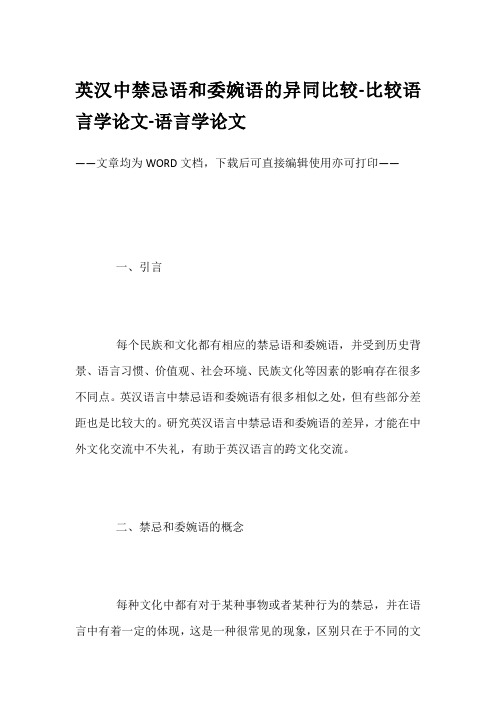
英汉中禁忌语和委婉语的异同比较-比较语言学论文-语言学论文——文章均为WORD文档,下载后可直接编辑使用亦可打印——一、引言每个民族和文化都有相应的禁忌语和委婉语,并受到历史背景、语言习惯、价值观、社会环境、民族文化等因素的影响存在很多不同点。
英汉语言中禁忌语和委婉语有很多相似之处,但有些部分差距也是比较大的。
研究英汉语言中禁忌语和委婉语的差异,才能在中外文化交流中不失礼,有助于英汉语言的跨文化交流。
二、禁忌和委婉语的概念每种文化中都有对于某种事物或者某种行为的禁忌,并在语言中有着一定的体现,这是一种很常见的现象,区别只在于不同的文化有不同的禁忌。
通常人们对神圣的、不洁的、危险的事物都存在一定的禁制。
通俗来说人们出于某种原因,不能、不愿说出某些具有不愉快的色彩或者至高无上而不可随意说出的词语就是禁忌语,比如脏话、秽的话等。
委婉语就是将某些神圣的、难听的、不便直说的、粗俗的、不吉利或者忌讳的词语、事物或者概念通过比较委婉的、文雅的、间接的词语表达出来,以达到比较委婉,顺耳,让人舒服的目的。
委婉语的特点是比较抽象、模糊。
简单来说,委婉语就是将某些让人不快的词语转化成一种易于接受的方式,采用间接的方式让说话者不会因此而感到内疚、尴尬、不安等。
三、英汉中禁忌语和委婉语的相同点英汉语言中禁忌语和委婉语存在很多相似之处,或者说对于同一种禁忌事物或者行为有相似的委婉表达。
一般来说,禁忌语相同的情况多出现在人类具有共同的特征上面,比如生老病死、相貌、职业、生理缺陷等。
尽管生老病是人的一生中必须要经历的事情,但人们还是对其有着某种程度上的畏惧。
不管是中西方文化都认为这种悲伤的事情不应该直接说出来,而是通过委婉的方式表达出来。
在汉语中,死有很多种表达方式,比如去了,老了等,官方的说法去世已逝等。
在古代文化中,地位不同的人说法也有很大的不同。
作为天子的,叫做驾崩,诸侯死了叫做亮;大夫死用卒,士死称为不禄.普通百姓如果死了绝对不能用这几个字,只能用没、终等词。
- 1、下载文档前请自行甄别文档内容的完整性,平台不提供额外的编辑、内容补充、找答案等附加服务。
- 2、"仅部分预览"的文档,不可在线预览部分如存在完整性等问题,可反馈申请退款(可完整预览的文档不适用该条件!)。
- 3、如文档侵犯您的权益,请联系客服反馈,我们会尽快为您处理(人工客服工作时间:9:00-18:30)。
1英汉委婉语的相同点
1)委婉是禁忌心理的产物。任何一种文化,任何一种社会,都存在语言禁忌。委婉语和禁
忌语休戚相关。自古以来,人类就对某些事物心存忌讳,为了交际的和谐顺利,为了交际双
方更易接受,遭到禁忌的事物的名称必须改头换面,有些刺激性的字眼,敏感的话题就得转
移,以一种人们认为“得体、高雅”的名称出现。对犯忌讳的事物或避而讳之或委婉言之,于
是避讳委婉的修辞手法应运而生。
2)共同的使用领域。随着社会的发展,委婉语已渗透到各个领域。中英两国在语言禁忌方
面有着各自的特色和民族习惯。但是,仍然有些领域的禁忌是在两个社会中普遍存在的,成
为了中英委婉语的共同使用领域。例如,英汉委婉语都与死亡、疾病、职业、犯罪、性和排
泄等密切相关。
A.表达死亡。在《圣经》或其它与基督教有关的传说中存在许多与死亡有关的委婉语,例
如:“to be with God”,“to be asleep in the Arms of God/in Jesus/to lie in Abraham’s
bosom”,“to go to heaven/paradise”,“to be promoted to glory”。西方人也认为人类生来有
原罪,也就必会受到惩罚,所以“死亡”也是“to pay the debt of nature”。 中国对于死亡有禁
忌,例如中国佛教把“死”婉称为“入寂”、“圆寂”;道家却称之为“仙去”、“仙逝”等。古代中国
皇帝死亡则称为“驾崩”、“弃群臣”;百姓之死称为“过世”、“作古”等。老者死亡称为“寿终”、“谢
世”;少年死亡称为“夭折”;中年死亡称为“早逝”;靓女弃世称作“玉陨香消”,等等。
B.人体排泄方面。如关于上厕所,英语有“wash one’s hand,relieve oneself, powder her
nose,还有”feel the call of nature”(感觉到自然在召唤),意为“要上厕所”;汉语有“洗手、方
便”。如果女士在场,就必须这样问:“我可以使用一下盥洗室吗?”或问“洗手间在什么地方?”
C.关于性的委婉语
在中国和西方国家里,性关系和身体的某些部位是谈话的禁忌。随着经济的发展和人们对性
解放的更深认识,在最近几年里西方国家对性的态度开放了许多。在小说和电影中类似“to
make love”,“to have sex with”,“to go to bed with”这样的语言也出现了。谈到性关系,中
国人更倾向于用“同房”,“夫妻生活”等语言来代替。英语中也有一些新创造的词汇“go to bed
with”,“be in bed”,“do it”。与汉语相比而言,英语拥有更多的关于性方面的词汇,这可能
与人们对性抱有更开放、更随意的态度有关。
D.教育生活方面:成绩差的学生是a below average student 或working on his own level,
而do betterwith help则指反应比较迟钝的学生。学生考试作弊则冠以to depend on others
to do his (her ) work.汉语中可用“学习要下劲、成绩要提高”来表达学习成绩差的含义。“考
试时做小动作”等来代替考试作弊。美国学生考试不及格,回家对其父母说:“I didn’t make it.”
E.社会地位、职业方面:对生活的贫富、职业的贵贱,倾向于低调陈述而不直言不讳。如
对贫穷,英语有disadvantaged,underprivileged,汉语有“手头拮据”。有一部分职业委婉
语,将一些平凡的职业名称予以改头换面,以此克服自卑感。比如hair dresser (女理发员)
被誉为beautician (美容师)、cook (炊事员)被称作chef (厨师)、janitor (守门人)被冠以
security officer(安全官员)。汉语中,我们称清洁工为“城市美容师”、小保姆为“小阿姨”、蹲
监狱为“在高墙里面”等等。
3)共同的表达方式
如:使用缩写和省略。在所有的文化中,为了避免不愉快,或表示礼貌,或掩饰某些东西,
某些词汇可能就会被省略掉。在英语里,“The woman is pregnant”被委婉的表达成“She is
expecting”,在这个句子里“a baby”就被省略了。同样,“out”就是“out of work”省略后的委婉
语。语音省略也是一种缩写,例如,“WC”是“water closet”,“G-man”是“garbage-man”的省
略。汉语里也有利用缩写词委婉表达意思的,例如,“行将就木”中的“木”是“棺木”的委婉表达
法。
2 英汉委婉语的不同点
1)英汉委婉语语义特点的不同
比较首先,有些英汉对应词的涵义不尽相同,所以表达同一事物的词语可能在一种语言中含
贬义,需要委婉语,而在另一种语言中却不含贬义,不需要委婉。比如,英语中bitch (母狗)
含有lechery (淫荡)之意,所以有“ladydog”,“girldog”的婉称,而汉语中则没有这种情况。
其次,汉语词义相对比较稳定,变化少,而英语词义则比较灵活,变化多。
2)英汉委婉语构词特点的不同
在构词上,英语委婉语可以通过字母缩略(shortening)等语音手段创造出来,这是汉语所不
及的。比如: (1)简缩。如用Ladies代Ladies-room, gents代gentlemen, Ca代cancer。
(2)词尾脱落(apocopation),这是另外一种缩略形式。如vampire (勾引男子的女人)词尾脱
落后成为vamp;homosexual (搞同性恋的人)成为homo。(3)首字母缩合。WC指称Water
Closet (厕所); VD代Venereal Disease (性病); BO代body odor (狐臭)。(4)逆构
(backformation)。例如, burgle (v.破门盗窃[某处],撬窃[某人的家])就是从burglar(n.夜盗;
窃贼;破门盗窃者)逆构而成的词。
3)委婉语的表达方式不同
两者在表达方法上的差异主要是由文化上的区别造成的。体现在很多方面,仅以一些数词委
婉语为例。在英语中,一些数词可以表达特殊的含义,比如在汉语里,八、六都是表示幸运
的数字,八十六在英语中的一种说法eighty-six (指醉酒)。
参考文献:
陈定安.英汉修辞与翻译[M].北京:中国青年出版社,2004.
许余龙.对比语言学[M].上海外语教育出版社, 2002.
